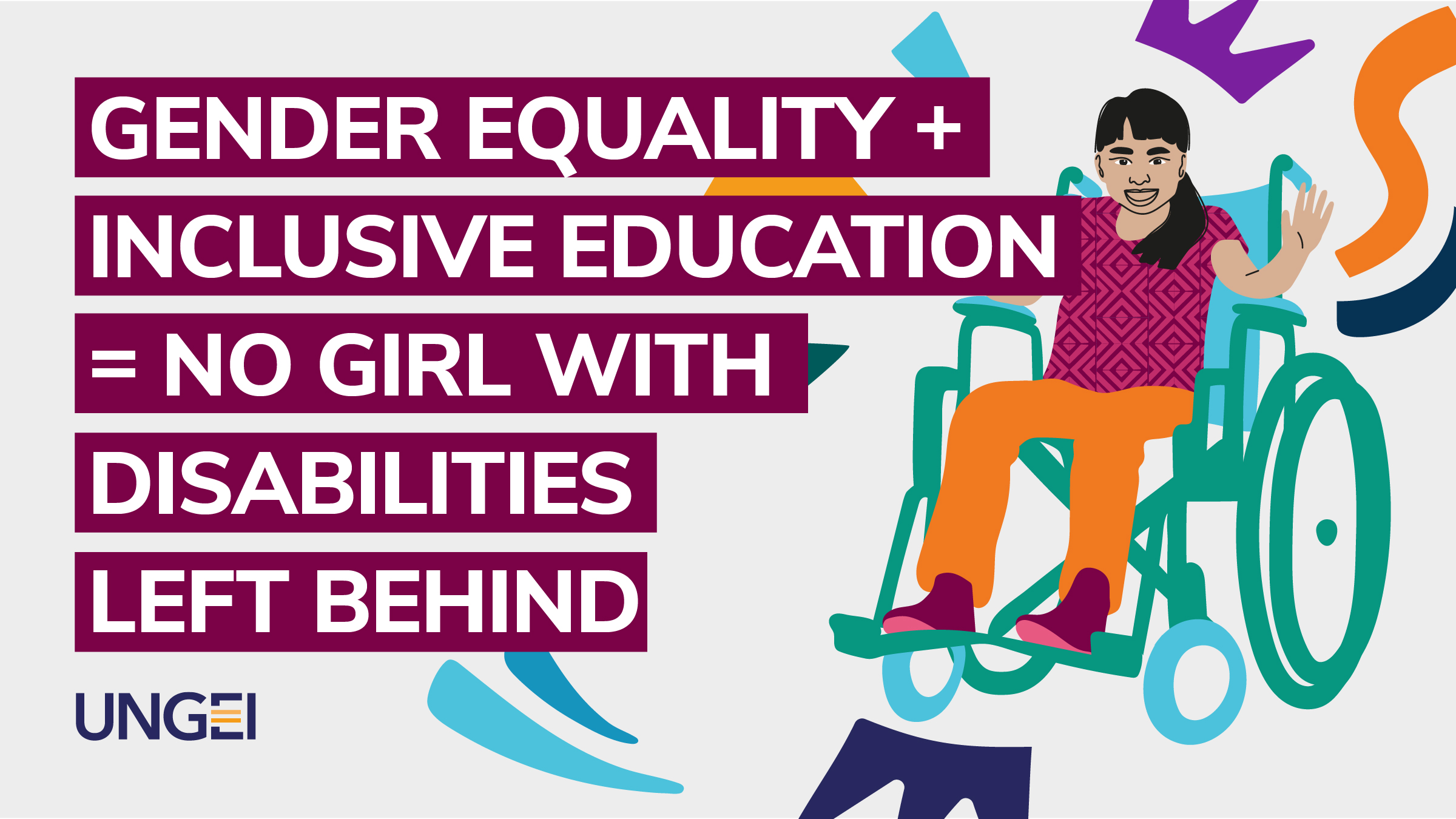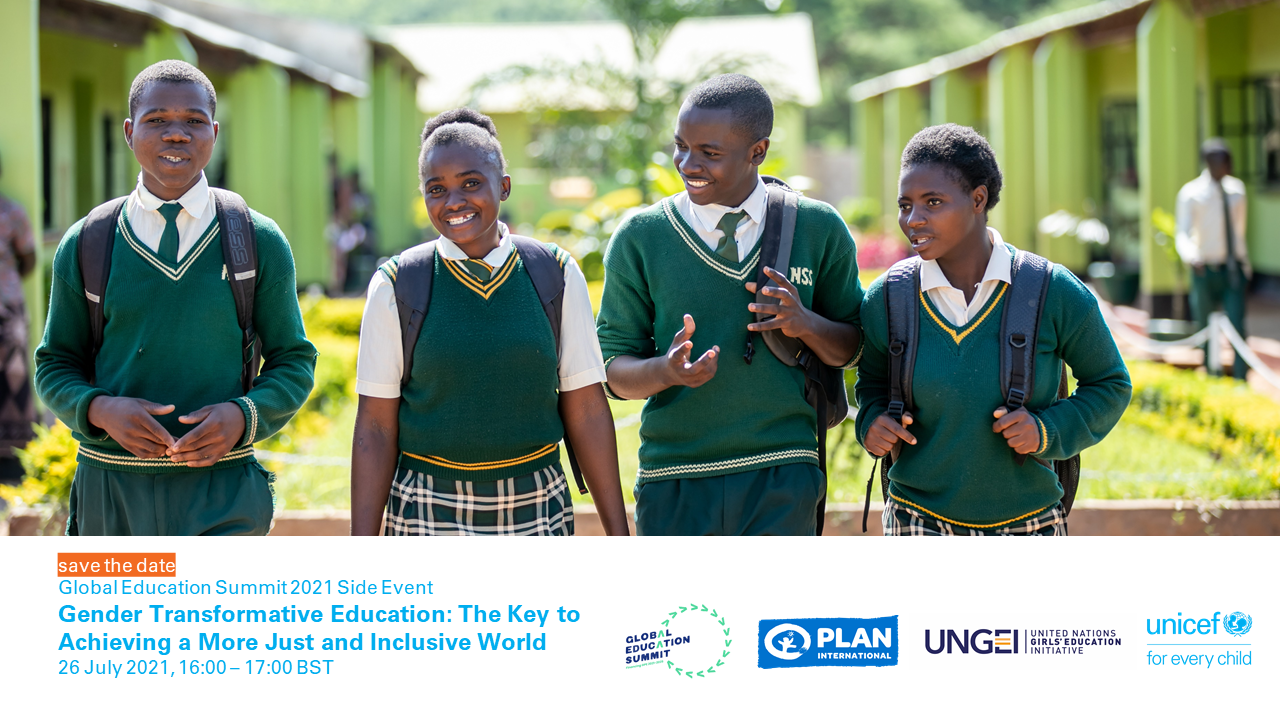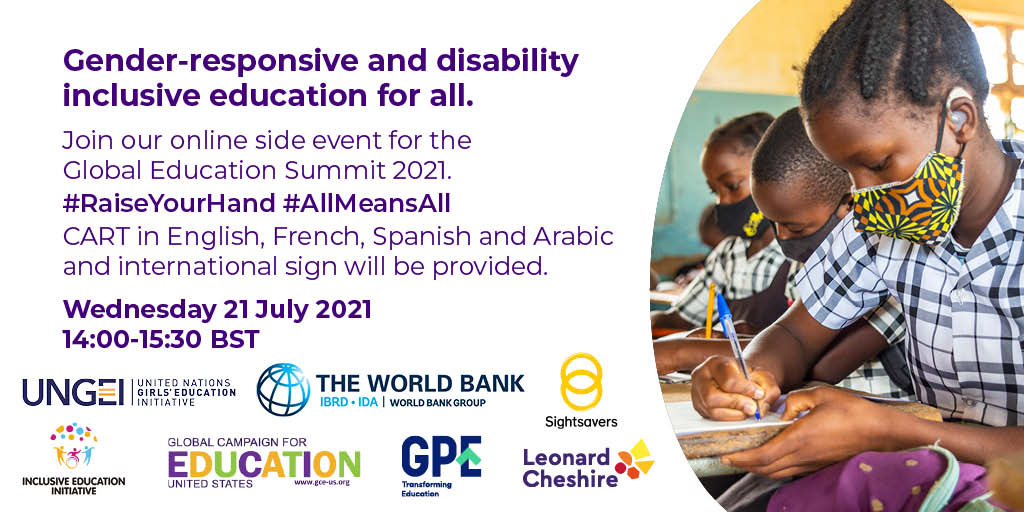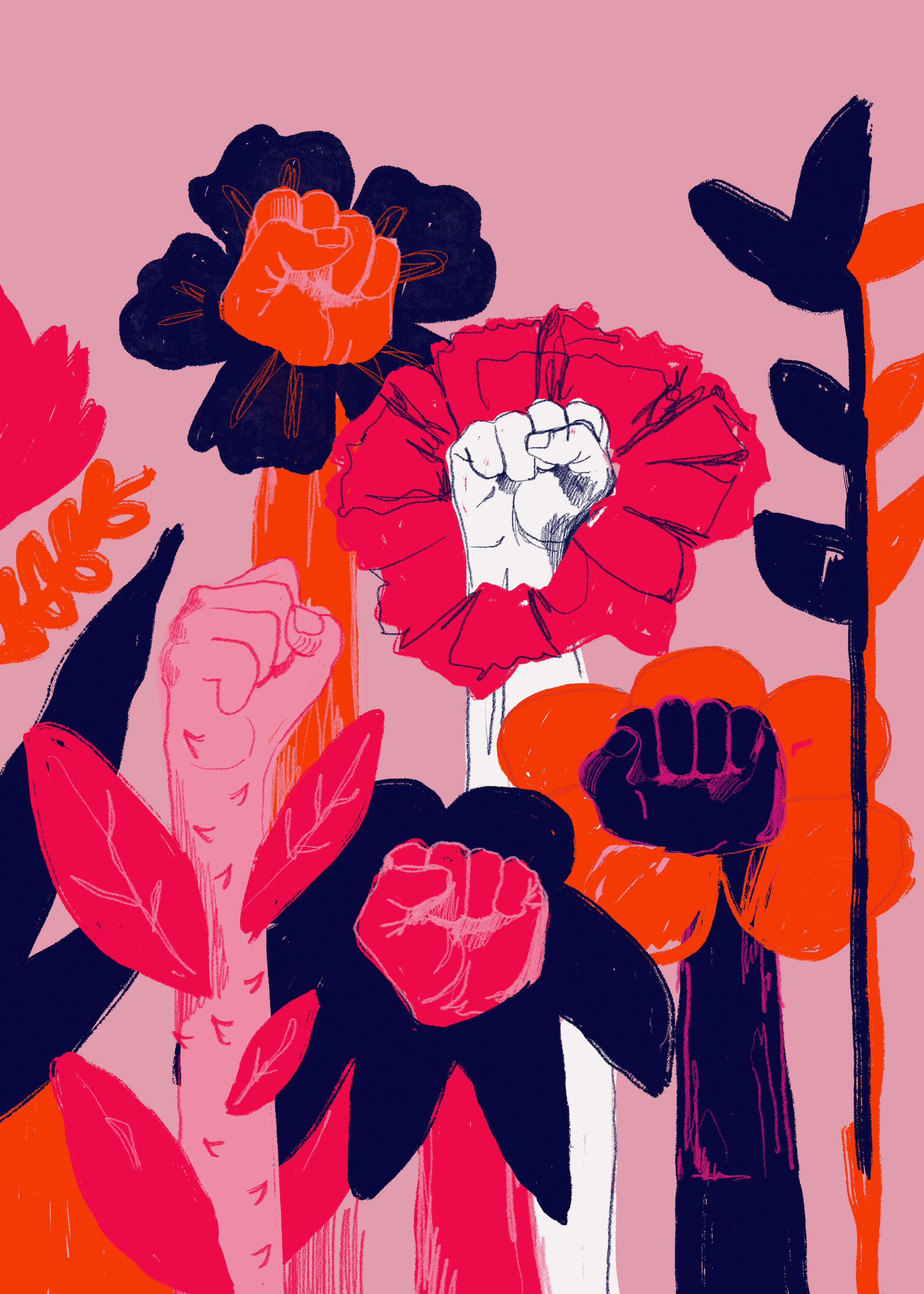On 16-17 February 2022, the International Disability Alliance (IDA), the Government of Norway, and the Government of Ghana will host the second Global Disability Summit. The Summit will mobilize efforts for the implementation of the UN Convention on the Rights of Persons with Disabilities (CRPD), the principle of ‘Leave No One Behind’ (LNOB) and building back better and more inclusive following the Covid-19 pandemic.
This year, the UN Girls’ Education Initiative (UNGEI) and Leonard Cheshire, with funding from the World Bank’s Inclusive Education Initiative, are launching a new research project on gender, disability and education. This research seeks to understand further the gendered experiences of learners with disabilities in education, particularly the marginalization faced by girls with disabilities, and in the context of Covid-19. In recent years, a number of initiatives and studies addressing the intersectionality of gender and disability in education have been carried out by CaNDER, Humanity & Inclusion, Sightsavers, and their country partners. Together, we are committed to advancing progress on gender equality and disability inclusion in education to ensure that learners with disabilities, and girls in particular, are not left further behind in the aftermath of the Covid-19 pandemic.
Call to action
It is in this context that UNGEI, Leonard Cheshire, Sightsavers, Humanity & Inclusion, the Cambridge Network for Disability and Education Research (CaNDER) and the Commonwealth Children and Youth with Disabilities Network (CCYDN) are joining together to call for:
- Inclusive education policies and programmes to address gender-specific barriers to access, participation and achievement in education for all learners with disabilities, including learners with more complex needs and girls in particular.
- Policy makers to champion gender and disability-responsive learning environments and support interventions that challenge the intersecting forms of discrimination that children, and girls in particular, experience on the basis of gender, disability and other social characteristics.
- Greater investment in research on the gendered experiences of learners with disabilities (e.g. with regards to learning outcomes, school-related gender-based violence, transition rates) to increase evidence around the impacts of disability-inclusive interventions and the effectiveness of gender-responsive approaches in education within different contexts.
- Increased funding for systematic, robust, national education data that is disaggregated by sex, age and disability.
- Meaningful partnership with community-based actors, Organisations of Persons with Disabilities (in particular women- and youth-led OPDs), parents’ and teachers’ associations in education policy and decision making.
- Targeted, gender-responsive support for learners with disabilities to catch up on lost learning during the Covid-19 pandemic; and safely continue their education.
- A twin-track approach to financing by providing resources to strengthen gender equality and disability-inclusion in education systems in general and, at the same time, dedicating a specific funding stream to meet the specific needs of learners with disabilities, particularly girls. These targeted allocations should be traceable in order to ensure accountability and assess progress and gaps, including by using the OECD DAC policy markers on gender equality and disability.
- Increased partnerships and spaces for learning and exchange among actors involved in gender, disability, and inclusive education — at the local, national, and international levels — in order to strengthen an intersectional approach to gender, disability and education.
- Public awareness strategies involving religious, traditional, and community leaders, women's organizations, youth-led organizations, young feminist activists, civil society, and local authorities, to combat stigma and discrmination around education for learners with disabilities, particularly girls, and to promote their right to education.
- Greater recognition of the role of teachers in tackling gender inequality, through increased investments towards the training, development and recruitment of qualified teachers , including teachers with disabilities and educational support staff to deliver disability-inclusive and gender transformative education.
- Increased focus on positive strategies, solutions and approaches to gender-responsive and inclusive education through a multi sectoral approach to support learners with disabilities to overcome gender-related barriers to education and achieve their aspirations.
This Global Disability Summit and beyond, we stand ready to work together to advance these objectives. Will you stand with us? Share our call to action and join us to stand in solidarity with children and youth with disabilities everywhere!
Register for upcoming #GDS2022 side events with UNGEI and partners
ICT - Towards the Inclusion of all Learners! Humanity & Inclusion, Sightsavers
16 Feb | 12:00 CET
Every Learner Matters: Sharing Experiences from the World Bank’s programs on Disability-Inclusive Education.
This event will feature a spotlight on UNGEI and Leonard Cheshire’s new research project.
Feb 17 | 06:30 EST
Click this link for more information and to register for events organized by Sightsavers and partners.
Tweet your support
Join us in calling for an intersectional approach to gender and disability in education! We stand in solidarity with @UNGEI @LeonardCheshire @HI_Advocacy @Sightsavers @CCYDNetwork call to action to ensure no learner with disabilities is left behind: https://www.ungei.org/blog-post/gds2022-call-to-action
#GDS2022 @GDS_Disability #CommitToChange

Explore more resources on gender, disability and education
Humanity and Inclusion (2021) Education, girl, disability: an equation to solve.
Nidhi Singal , Shruti Taneja-Johansson & Niraj Poudyal (2021) Reflections on the gendered impact of Covid-19 on education for children with disabilities in Nepal.
Leonard Cheshire (2021) Every Girl’s Right.
CaNDER (2021) Four priorities in inclusive education for the Global Disability Summit 2022
UNGEI and Leonard Cheshire (2021) Leave No Girl With Disabilities Behind: Ensuring efforts to advance gender equality in education are disability-inclusive
Sightsavers (2020) Policy brief: Promoting inclusive education for girls and boys with disabilities in West and Central Africa
UNGEI and Leonard Cheshire (2017) Still left behind: Pathways to inclusive education for girls with disabilities



 English
English العربية
العربية Български
Български Hrvatski
Hrvatski Čeština
Čeština Dansk
Dansk Nederlands
Nederlands Suomi
Suomi Français
Français Deutsch
Deutsch Ελληνικά
Ελληνικά हिन्दी
हिन्दी Italiano
Italiano Română
Română Русский
Русский Español
Español Maltese
Maltese Zulu
Zulu አማርኛ
አማርኛ